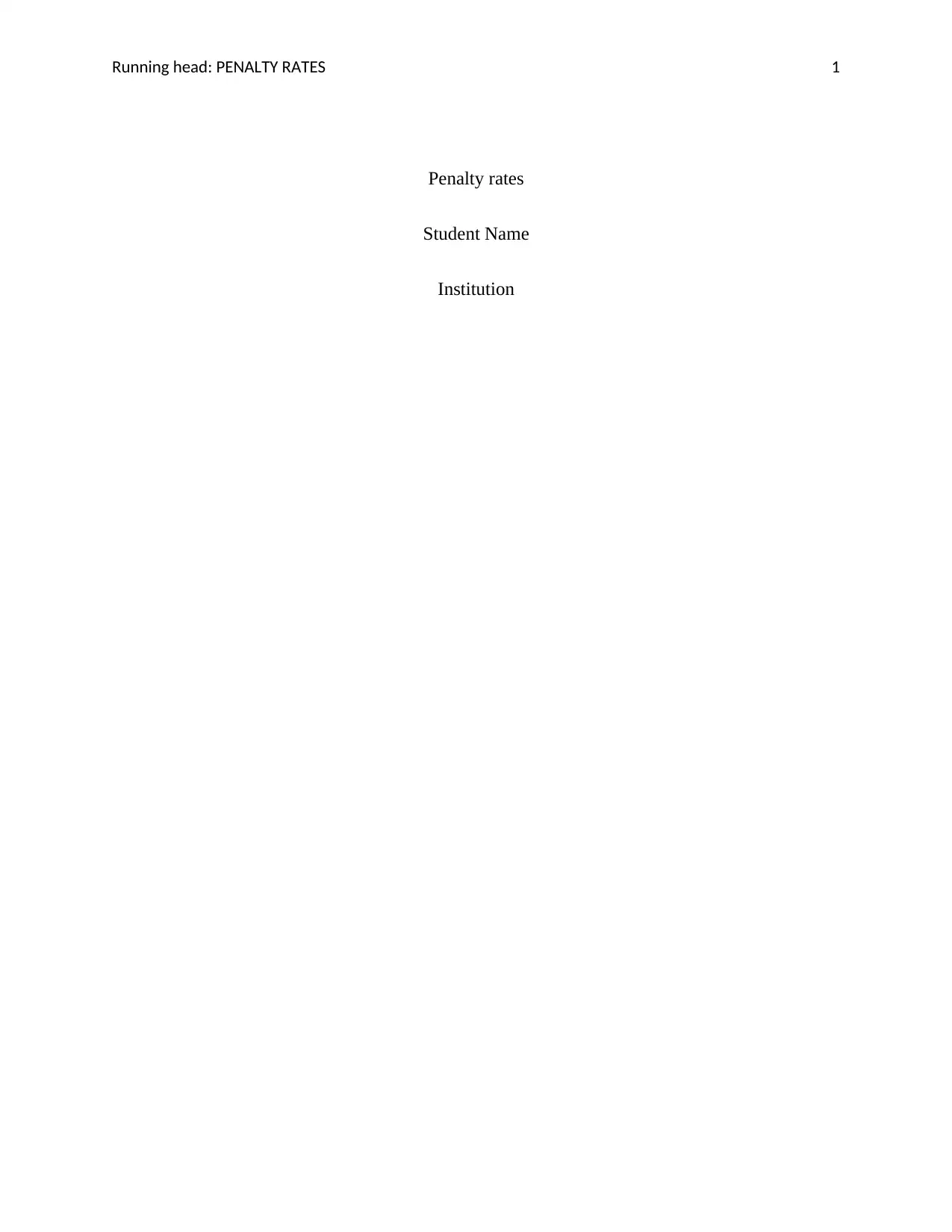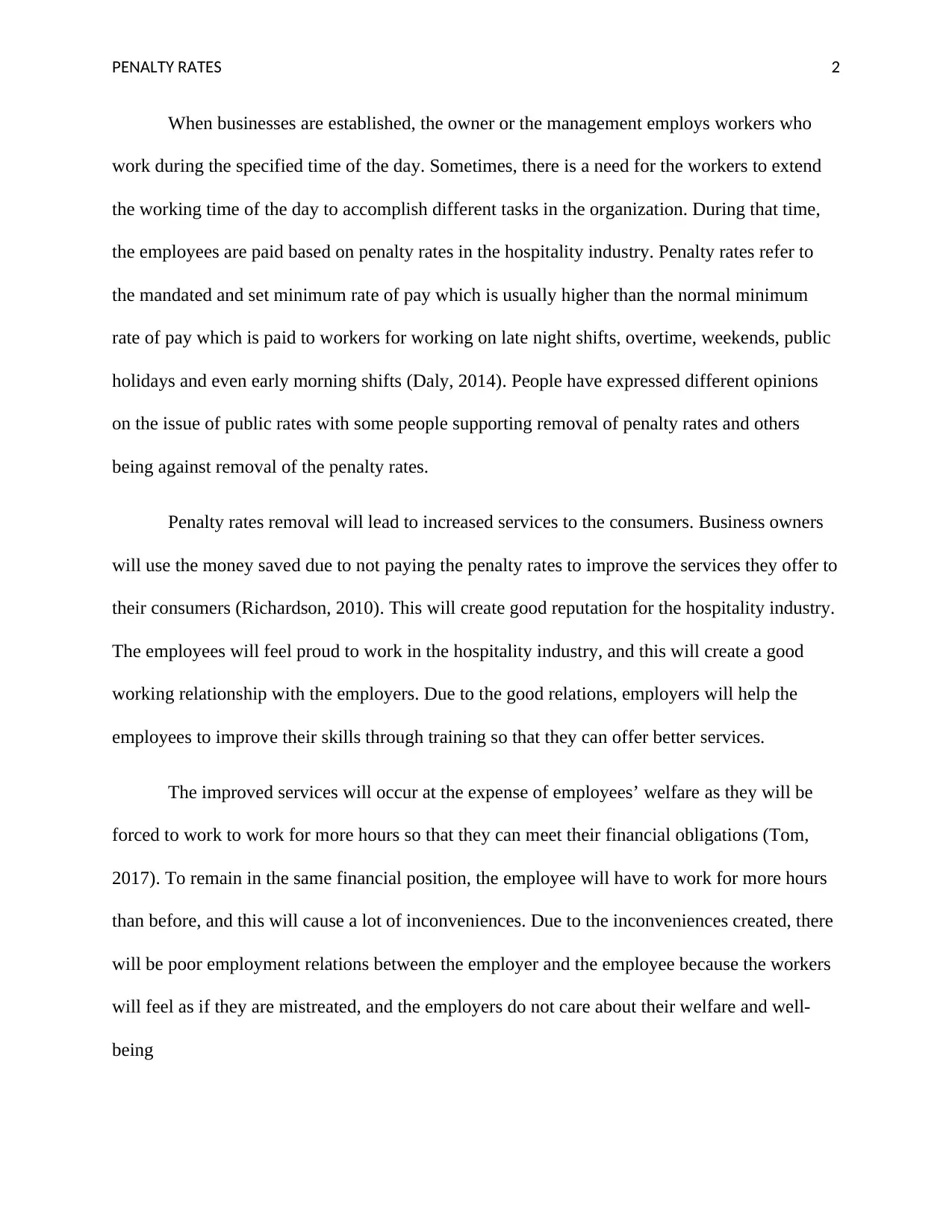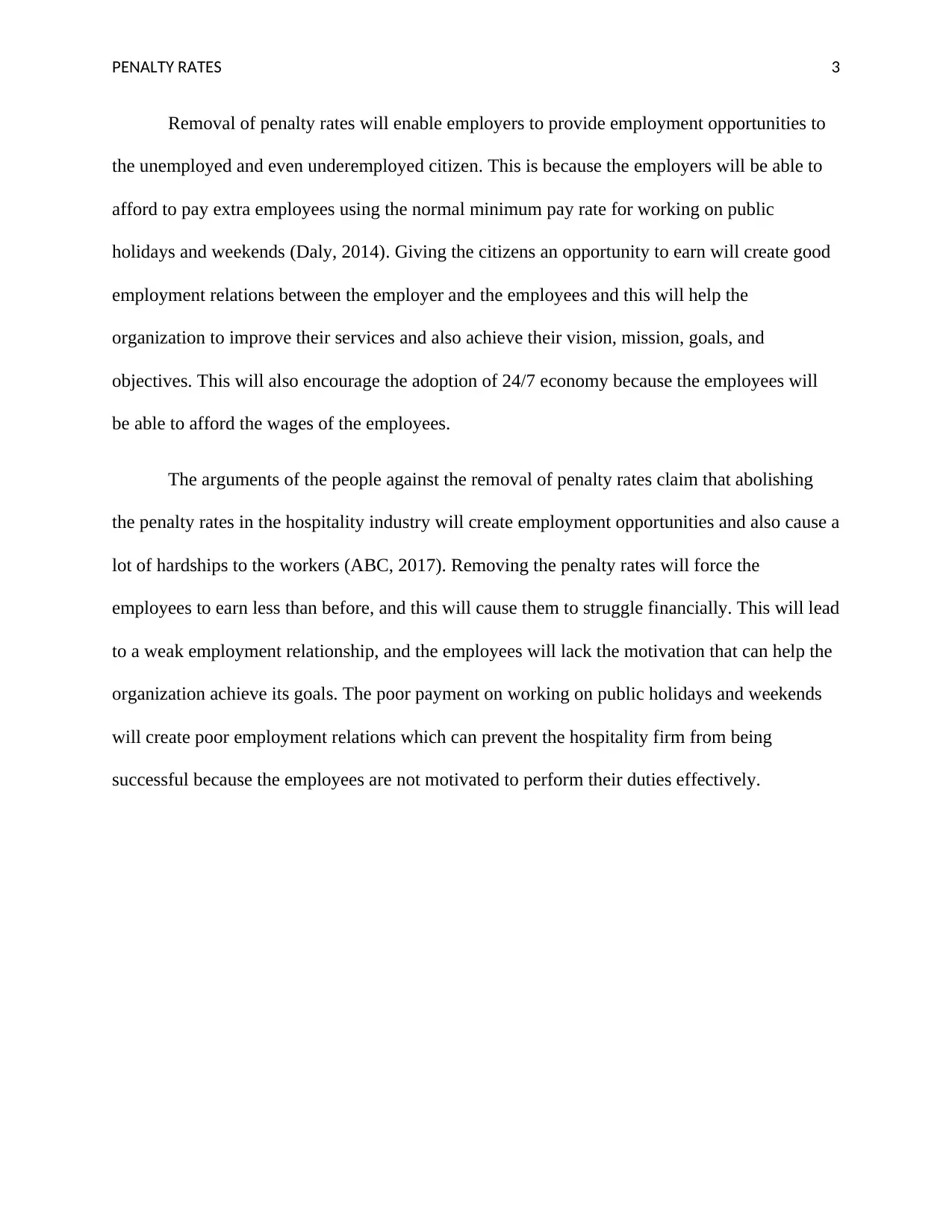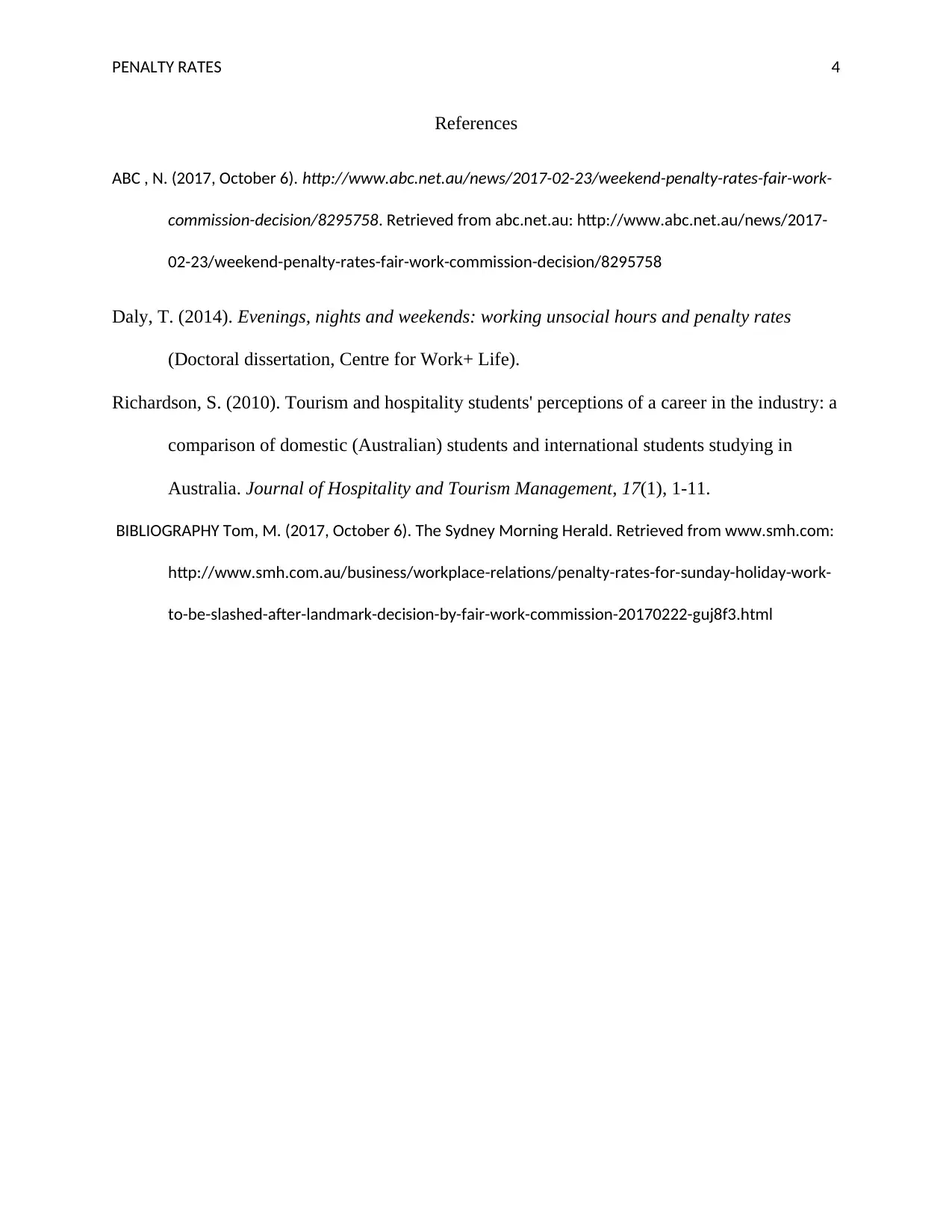Penalty Rates in the Hospitality Industry
VerifiedAdded on 2020/03/16
|5
|730
|35
Essay
AI Summary
This essay discusses the concept of penalty rates in the hospitality industry, examining the arguments for and against their removal. It highlights how penalty rates affect employee welfare, service quality, and employment relations, ultimately influencing the overall success of businesses in the sector.

Running head: PENALTY RATES 1
Penalty rates
Student Name
Institution
Penalty rates
Student Name
Institution
Paraphrase This Document
Need a fresh take? Get an instant paraphrase of this document with our AI Paraphraser

PENALTY RATES 2
When businesses are established, the owner or the management employs workers who
work during the specified time of the day. Sometimes, there is a need for the workers to extend
the working time of the day to accomplish different tasks in the organization. During that time,
the employees are paid based on penalty rates in the hospitality industry. Penalty rates refer to
the mandated and set minimum rate of pay which is usually higher than the normal minimum
rate of pay which is paid to workers for working on late night shifts, overtime, weekends, public
holidays and even early morning shifts (Daly, 2014). People have expressed different opinions
on the issue of public rates with some people supporting removal of penalty rates and others
being against removal of the penalty rates.
Penalty rates removal will lead to increased services to the consumers. Business owners
will use the money saved due to not paying the penalty rates to improve the services they offer to
their consumers (Richardson, 2010). This will create good reputation for the hospitality industry.
The employees will feel proud to work in the hospitality industry, and this will create a good
working relationship with the employers. Due to the good relations, employers will help the
employees to improve their skills through training so that they can offer better services.
The improved services will occur at the expense of employees’ welfare as they will be
forced to work to work for more hours so that they can meet their financial obligations (Tom,
2017). To remain in the same financial position, the employee will have to work for more hours
than before, and this will cause a lot of inconveniences. Due to the inconveniences created, there
will be poor employment relations between the employer and the employee because the workers
will feel as if they are mistreated, and the employers do not care about their welfare and well-
being
When businesses are established, the owner or the management employs workers who
work during the specified time of the day. Sometimes, there is a need for the workers to extend
the working time of the day to accomplish different tasks in the organization. During that time,
the employees are paid based on penalty rates in the hospitality industry. Penalty rates refer to
the mandated and set minimum rate of pay which is usually higher than the normal minimum
rate of pay which is paid to workers for working on late night shifts, overtime, weekends, public
holidays and even early morning shifts (Daly, 2014). People have expressed different opinions
on the issue of public rates with some people supporting removal of penalty rates and others
being against removal of the penalty rates.
Penalty rates removal will lead to increased services to the consumers. Business owners
will use the money saved due to not paying the penalty rates to improve the services they offer to
their consumers (Richardson, 2010). This will create good reputation for the hospitality industry.
The employees will feel proud to work in the hospitality industry, and this will create a good
working relationship with the employers. Due to the good relations, employers will help the
employees to improve their skills through training so that they can offer better services.
The improved services will occur at the expense of employees’ welfare as they will be
forced to work to work for more hours so that they can meet their financial obligations (Tom,
2017). To remain in the same financial position, the employee will have to work for more hours
than before, and this will cause a lot of inconveniences. Due to the inconveniences created, there
will be poor employment relations between the employer and the employee because the workers
will feel as if they are mistreated, and the employers do not care about their welfare and well-
being

PENALTY RATES 3
Removal of penalty rates will enable employers to provide employment opportunities to
the unemployed and even underemployed citizen. This is because the employers will be able to
afford to pay extra employees using the normal minimum pay rate for working on public
holidays and weekends (Daly, 2014). Giving the citizens an opportunity to earn will create good
employment relations between the employer and the employees and this will help the
organization to improve their services and also achieve their vision, mission, goals, and
objectives. This will also encourage the adoption of 24/7 economy because the employees will
be able to afford the wages of the employees.
The arguments of the people against the removal of penalty rates claim that abolishing
the penalty rates in the hospitality industry will create employment opportunities and also cause a
lot of hardships to the workers (ABC, 2017). Removing the penalty rates will force the
employees to earn less than before, and this will cause them to struggle financially. This will lead
to a weak employment relationship, and the employees will lack the motivation that can help the
organization achieve its goals. The poor payment on working on public holidays and weekends
will create poor employment relations which can prevent the hospitality firm from being
successful because the employees are not motivated to perform their duties effectively.
Removal of penalty rates will enable employers to provide employment opportunities to
the unemployed and even underemployed citizen. This is because the employers will be able to
afford to pay extra employees using the normal minimum pay rate for working on public
holidays and weekends (Daly, 2014). Giving the citizens an opportunity to earn will create good
employment relations between the employer and the employees and this will help the
organization to improve their services and also achieve their vision, mission, goals, and
objectives. This will also encourage the adoption of 24/7 economy because the employees will
be able to afford the wages of the employees.
The arguments of the people against the removal of penalty rates claim that abolishing
the penalty rates in the hospitality industry will create employment opportunities and also cause a
lot of hardships to the workers (ABC, 2017). Removing the penalty rates will force the
employees to earn less than before, and this will cause them to struggle financially. This will lead
to a weak employment relationship, and the employees will lack the motivation that can help the
organization achieve its goals. The poor payment on working on public holidays and weekends
will create poor employment relations which can prevent the hospitality firm from being
successful because the employees are not motivated to perform their duties effectively.
⊘ This is a preview!⊘
Do you want full access?
Subscribe today to unlock all pages.

Trusted by 1+ million students worldwide

PENALTY RATES 4
References
ABC , N. (2017, October 6). http://www.abc.net.au/news/2017-02-23/weekend-penalty-rates-fair-work-
commission-decision/8295758. Retrieved from abc.net.au: http://www.abc.net.au/news/2017-
02-23/weekend-penalty-rates-fair-work-commission-decision/8295758
Daly, T. (2014). Evenings, nights and weekends: working unsocial hours and penalty rates
(Doctoral dissertation, Centre for Work+ Life).
Richardson, S. (2010). Tourism and hospitality students' perceptions of a career in the industry: a
comparison of domestic (Australian) students and international students studying in
Australia. Journal of Hospitality and Tourism Management, 17(1), 1-11.
BIBLIOGRAPHY Tom, M. (2017, October 6). The Sydney Morning Herald. Retrieved from www.smh.com:
http://www.smh.com.au/business/workplace-relations/penalty-rates-for-sunday-holiday-work-
to-be-slashed-after-landmark-decision-by-fair-work-commission-20170222-guj8f3.html
References
ABC , N. (2017, October 6). http://www.abc.net.au/news/2017-02-23/weekend-penalty-rates-fair-work-
commission-decision/8295758. Retrieved from abc.net.au: http://www.abc.net.au/news/2017-
02-23/weekend-penalty-rates-fair-work-commission-decision/8295758
Daly, T. (2014). Evenings, nights and weekends: working unsocial hours and penalty rates
(Doctoral dissertation, Centre for Work+ Life).
Richardson, S. (2010). Tourism and hospitality students' perceptions of a career in the industry: a
comparison of domestic (Australian) students and international students studying in
Australia. Journal of Hospitality and Tourism Management, 17(1), 1-11.
BIBLIOGRAPHY Tom, M. (2017, October 6). The Sydney Morning Herald. Retrieved from www.smh.com:
http://www.smh.com.au/business/workplace-relations/penalty-rates-for-sunday-holiday-work-
to-be-slashed-after-landmark-decision-by-fair-work-commission-20170222-guj8f3.html
Paraphrase This Document
Need a fresh take? Get an instant paraphrase of this document with our AI Paraphraser

PENALTY RATES 5
1 out of 5
Related Documents
Your All-in-One AI-Powered Toolkit for Academic Success.
+13062052269
info@desklib.com
Available 24*7 on WhatsApp / Email
![[object Object]](/_next/static/media/star-bottom.7253800d.svg)
Unlock your academic potential
Copyright © 2020–2026 A2Z Services. All Rights Reserved. Developed and managed by ZUCOL.





